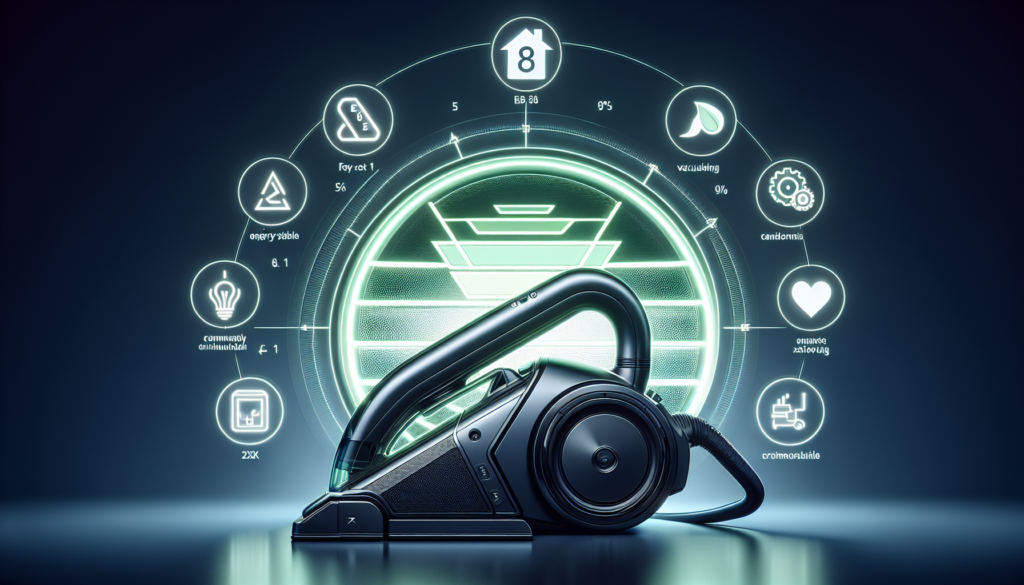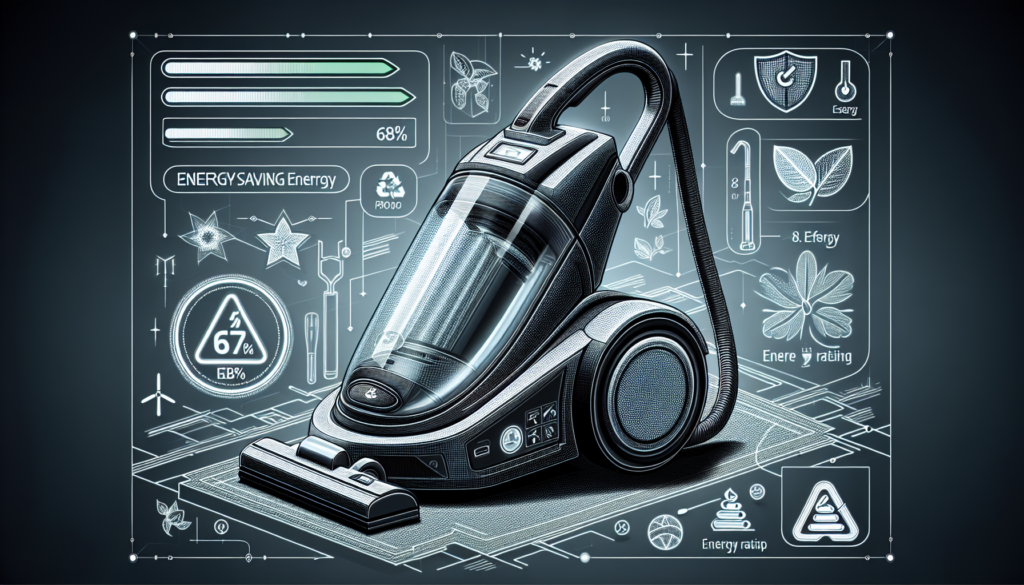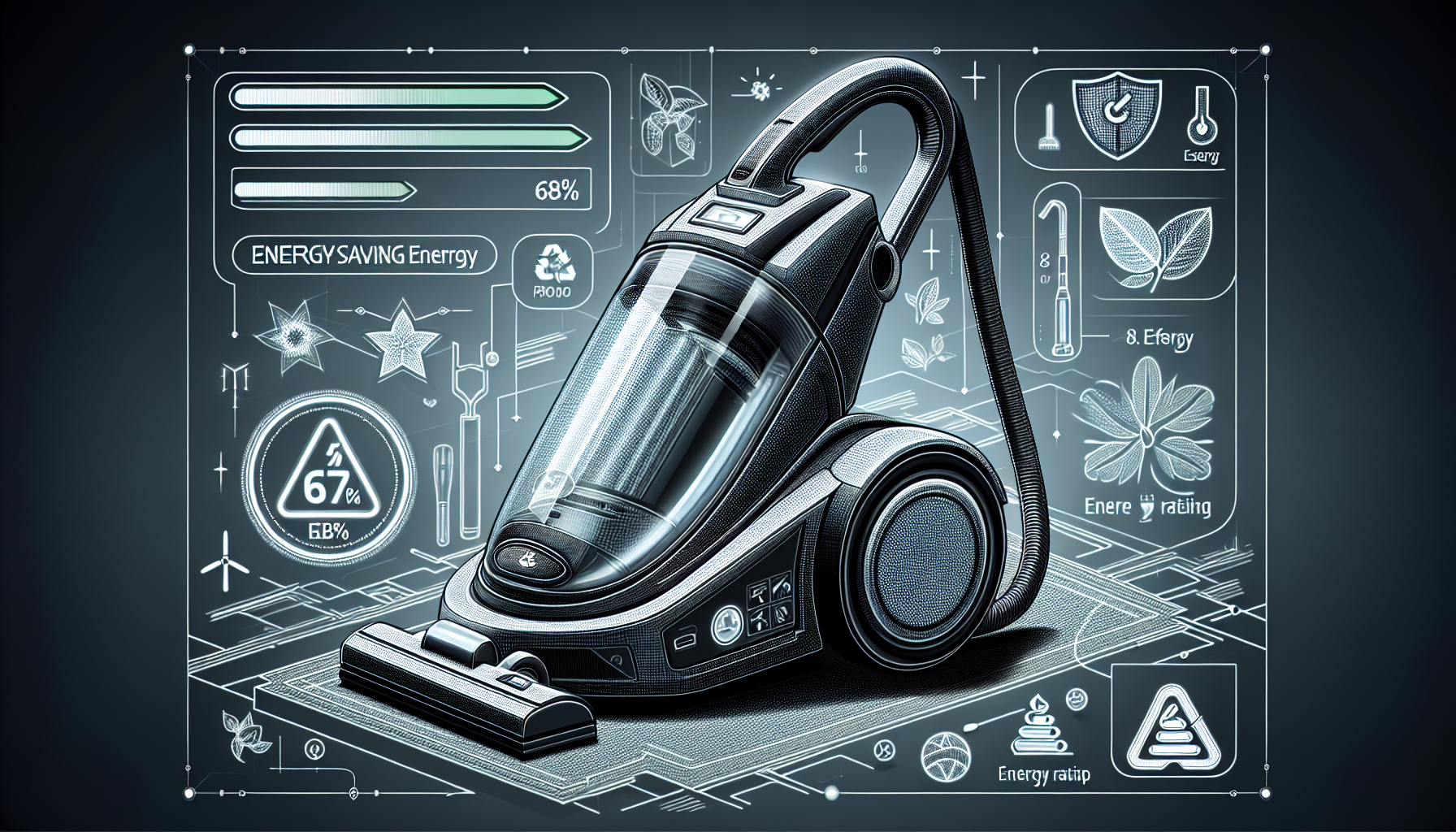We’ve all been there – standing in the aisle of the store, staring at rows upon rows of vacuum cleaners, wondering which one to choose. But what if there was a way to know which vacuum cleaner is not only effective at cleaning but also efficient when it comes to energy use? In this article, we’ll explore a few key factors that can help us determine the energy efficiency of a vacuum cleaner, so we can make an informed decision and reduce our environmental impact. Have you ever wondered if your vacuum cleaner is energy efficient? It’s an important consideration, especially if you’re conscious of reducing your carbon footprint and saving money on your electricity bills. In this article, we will explore the various factors that contribute to energy efficiency in vacuum cleaners, helping you make an informed decision when purchasing your next cleaning companion.

Energy Efficiency Ratings
Understanding energy efficiency ratings
When it comes to gauging the energy efficiency of a vacuum cleaner, it’s essential to look for relevant ratings and certifications. These can provide valuable insights into how much power the vacuum consumes and its overall efficiency. The most common rating to look out for is the Energy Star label.
What is the Energy Star label?
The Energy Star label is a certification program initiated by the United States Environmental Protection Agency (EPA) and the Department of Energy (DOE). It signifies that a product meets strict requirements for energy efficiency, reducing greenhouse gas emissions and saving you money. When a vacuum cleaner bears the Energy Star label, you can trust that it will use less energy without compromising its cleaning performance.
Other energy efficiency certifications
Apart from the Energy Star label, there are other energy efficiency certifications and labels you can look out for. These include the Blue Angel, Energy Savings Trust, and the EU Energy Label. These certifications ensure that the vacuum cleaner has met specific criteria to provide optimal energy efficiency, reducing its environmental impact and operating costs. It’s always worth checking for these certifications to make an informed choice.
Power Consumption
Wattage and power consumption
Power consumption is a crucial factor in determining the energy efficiency of a vacuum cleaner. The wattage rating indicates the maximum power the vacuum can consume. However, it’s important to note that higher wattage doesn’t necessarily translate to better cleaning performance. In fact, advancements in technology have allowed for more efficient cleaning with lower wattage.
Calculating energy usage
To determine the energy usage of a vacuum cleaner, you can multiply the wattage by the amount of time you typically use the vacuum. For example, if your vacuum cleaner has a wattage rating of 1000 watts and you use it for 30 minutes per cleaning session, the energy usage would be 500 watt-hours (1000 watts multiplied by 0.5 hours). This calculation can help you compare different vacuum cleaner models and estimate their long-term energy costs.
Comparing power consumption
When comparing power consumption between vacuum cleaners, it’s important to consider their cleaning capabilities and efficiency. A vacuum cleaner with a lower wattage may still perform exceptionally well due to its innovative design and technology. Therefore, it’s crucial to look beyond wattage and consider other factors such as suction power, filtration, and specialized cleaning modes.
Suction Power
Importance of suction power in energy efficiency
Efficient suction power plays a vital role in energy efficiency as it determines how effectively the vacuum cleaner removes dirt and debris from various surfaces. A vacuum cleaner with strong suction power can quickly and efficiently pick up particles in a single pass, reducing the need for multiple sweeps and potentially saving energy.
Efficient suction systems
Innovative suction systems incorporate advanced technologies to optimize suction power while minimizing energy consumption. These systems often feature high-performance motors, strategically designed airflow paths, and specialized nozzles and brushes. By focusing the suction power where it’s needed most, these vacuum cleaners provide efficient cleaning results with minimal energy wastage.
Factors affecting suction power
Several factors can affect the suction power of a vacuum cleaner. Firstly, the design and efficiency of the motor play a crucial role. A high-quality motor can deliver consistent and powerful suction, ensuring efficient cleaning performance. Additionally, factors such as the type and condition of filters, the length and quality of the hose, and the overall airflow design can all impact suction power. Choosing a vacuum cleaner with well-designed components and efficient airflow can help maximize energy efficiency while maintaining excellent cleaning capabilities.

Filtration Technology
Impact of filtration on energy consumption
Filtration technology not only contributes to clean air in your home but also affects the energy consumption of a vacuum cleaner. Efficient filtration systems trap the smallest particles, preventing them from being released back into the air. This not only improves indoor air quality but also reduces the accumulation of dirt and debris in the vacuum cleaner, optimizing its performance and minimizing the need for excessive energy usage.
HEPA filters and energy efficiency
High-Efficiency Particulate Air (HEPA) filters are considered the gold standard in filtration technology. These filters trap 99.97% of particles as small as 0.3 microns, preventing allergens, dust mites, and other fine particles from being released back into the air. By using a vacuum cleaner equipped with HEPA filters, you can ensure efficient filtration without compromising energy efficiency, as the filters are designed to maintain optimal airflow and cleaning performance.
Cyclonic filtration systems
Cyclonic filtration systems are another effective option for energy-efficient vacuum cleaners. These systems use centrifugal force to separate dirt and debris from the airflow, without the need for disposable bags or filters. By minimizing the clogging of filters, cyclonic filtration systems can maintain consistent suction power and energy efficiency throughout their usage. Additionally, the absence of disposable bags reduces environmental waste and ongoing costs.
Multi-Surface Cleaning
Efficiency in cleaning different surfaces
A vacuum cleaner that excels at cleaning various surfaces efficiently can contribute significantly to energy efficiency. Each surface requires a different level of suction power, brush movement, and cleaning technique. A versatile vacuum cleaner that automatically adjusts its settings to suit the surface being cleaned can save time and energy by eliminating the need for manual adjustments.
Adjustable brush height and energy usage
Some vacuum cleaners offer adjustable brush height settings, allowing you to optimize cleaning performance for different types of flooring. By setting the brush at the optimal height, you can ensure efficient cleaning without excessive energy consumption. For example, a lower brush height may be suitable for carpets with deep pile, while a higher brush height works better for hard floors. This adaptability enables energy-efficient cleaning tailored to each specific surface.
Adaptable cleaning modes
Advanced vacuum cleaners often feature adaptable cleaning modes that allow you to switch between different settings depending on the task at hand. For example, a dedicated “Eco” mode can be used for regular maintenance cleaning, while a more powerful “High Performance” mode can be activated for deep cleaning sessions. By adjusting the settings to match the cleaning requirements, you can optimize energy usage and cleaning efficiency simultaneously.
Smart Features and Sensors
Automated power adjustment
Vacuum cleaners equipped with smart features and sensors offer an additional layer of energy efficiency. These intelligent devices can automatically adjust their power and suction settings based on the type of surface being cleaned or the amount of dirt detected. By only using the necessary power, they minimize energy consumption while maintaining effective cleaning performance.
Intelligent dust detection
Some vacuum cleaners utilize advanced sensors to detect the level of dust and debris in the environment. These sensors can adjust the suction power accordingly to optimize cleaning efficiency. By focusing the suction on areas with higher dirt concentration, these vacuum cleaners can save energy by avoiding excessive power usage in cleaner areas.
Efficiency monitoring and reporting
Certain vacuum cleaners provide efficiency monitoring and reporting features that track and display important energy consumption data. These features allow you to understand your vacuum cleaner’s energy usage patterns, identify areas where improvements can be made, and make adjustments to maximize energy efficiency. By having access to this information, you can take informed steps towards reducing energy consumption and minimizing your ecological impact.
Noise Levels
Relationship between noise and energy consumption
The noise levels produced by a vacuum cleaner can be indicative of its energy consumption. Traditional vacuum cleaners with higher noise levels often utilize more power to produce the desired suction and airflow. Conversely, quieter vacuum cleaners that operate with less noise can still maintain efficient cleaning performance while consuming less energy.
Quiet operation and energy efficiency
Vacuum cleaners equipped with noise reduction technology can provide a quieter cleaning experience without compromising energy efficiency. These models utilize innovative design features, such as insulated motors, sound-damping materials, and strategic airflow management, to minimize noise levels while maintaining effective cleaning capabilities. By choosing a vacuum cleaner with reduced noise output, you can enjoy a peaceful cleaning environment while saving energy.
Noise reduction technology
Noise reduction technology is constantly evolving, and vacuum cleaner manufacturers are continually improving sound dampening techniques. Some advanced vacuum cleaners are built with insulation, sealed compartments, and noise-absorbing materials to maximize quiet operation. These technologies reduce the need for excessive power consumption to generate suction, making vacuuming a more energy-efficient process overall.
Product Lifespan
Longevity and energy efficiency
The lifespan of a vacuum cleaner can directly impact its energy efficiency. A durable and well-built vacuum cleaner has the potential to serve you for many years, reducing the need for frequent replacements. By investing in a high-quality vacuum cleaner that lasts, you can make long-term energy savings and minimize the environmental impact associated with manufacturing and disposing of multiple appliances.
Durable materials and components
When choosing a vacuum cleaner, consider the materials and components used in its construction. Opting for models made with high-quality and durable materials ensures greater reliability and longevity. Stainless steel or reinforced plastic parts, sturdy hoses and connectors, and robust motors can all contribute to a vacuum cleaner’s durability and overall energy efficiency.
Maintenance and servicing
Regular maintenance and servicing can significantly extend the lifespan of a vacuum cleaner. Following manufacturer recommendations for cleaning filters, emptying dust canisters, and inspecting and replacing worn components can help maintain optimal energy efficiency. Additionally, professional servicing at recommended intervals can identify potential issues early on, ensuring your vacuum cleaner continues to perform efficiently throughout its lifespan.
User Reviews
Considering user feedback on energy consumption
When evaluating the energy efficiency of a vacuum cleaner, user reviews can provide valuable insights. Reading reviews from individuals who have purchased and used the vacuum cleaner can help you understand real-world experiences and how the product performs in terms of energy consumption. Look for reviews that specifically address energy efficiency, as these can aid in making an informed decision.
Online reviews and ratings
Numerous websites and platforms allow users to review and rate vacuum cleaners, often including energy efficiency as one of the factors considered. These reviews offer a collective overview of how different models compare in terms of energy consumption, noise levels, cleaning performance, and overall satisfaction. By referring to these reviews, you can gauge the energy efficiency of a vacuum cleaner before making a purchase.
Common user complaints
Paying attention to common user complaints can also provide insights into energy efficiency concerns. Users often mention excessive energy usage, high electricity bills, or diminished performance over time as specific issues. Identifying recurring problems related to energy consumption can help you avoid models with similar drawbacks and make an informed decision based on user experiences.
Energy-Saving Tips
Utilizing energy-saving features
To maximize energy efficiency while using your vacuum cleaner, take advantage of any energy-saving features it may have. These features can include power adjustment modes, manual or automatic timers to limit cleaning duration, or intelligent sensors that optimize power consumption. By utilizing these features, you can ensure that your vacuum cleaner operates at its most efficient while meeting your cleaning needs.
Optimal vacuuming techniques
Adopting optimal vacuuming techniques can also contribute to energy savings. Start by decluttering the areas you plan to vacuum, as this reduces the time and effort required to clean a space. Additionally, vacuuming in straight lines and overlapping slightly with each pass ensures thorough cleaning without the need for excessive repetitions. These techniques not only save time but also help optimize energy usage.
Maximizing efficiency through cleaning schedule
Establishing a cleaning schedule can help optimize energy usage by reducing the frequency of vacuuming sessions. By regularly cleaning your floors and maintaining a tidy home, you can minimize the accumulation of dirt and debris, reducing the need for extensive cleaning. This approach not only saves energy but also ensures your vacuum cleaner operates at peak efficiency by preventing clogging and maintaining suction power.
In conclusion, understanding the energy efficiency of a vacuum cleaner is crucial for making an informed purchase that aligns with your sustainability goals and energy savings. Consider factors such as energy efficiency ratings, power consumption, suction power, filtration technology, multi-surface cleaning abilities, smart features and sensors, noise levels, product lifespan, and user reviews. Implement energy-saving tips to maximize efficiency during usage and prolong the lifespan of your vacuum cleaner. By prioritizing energy efficiency, you can make a significant impact on both your energy bills and the environment.

